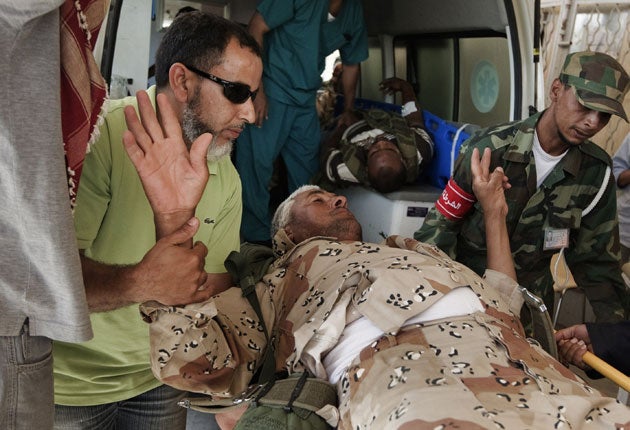Opposition fighters are losing battles – but winning the war
Analysis

Your support helps us to tell the story
From reproductive rights to climate change to Big Tech, The Independent is on the ground when the story is developing. Whether it's investigating the financials of Elon Musk's pro-Trump PAC or producing our latest documentary, 'The A Word', which shines a light on the American women fighting for reproductive rights, we know how important it is to parse out the facts from the messaging.
At such a critical moment in US history, we need reporters on the ground. Your donation allows us to keep sending journalists to speak to both sides of the story.
The Independent is trusted by Americans across the entire political spectrum. And unlike many other quality news outlets, we choose not to lock Americans out of our reporting and analysis with paywalls. We believe quality journalism should be available to everyone, paid for by those who can afford it.
Your support makes all the difference.While foreign countries were hailing Libya's rebel administration as the country's legitimate government, rebel fighters were showing their usual failings in combat as another much-heralded offensive in the east failed to capture the oil town of Brega.
Four months into Nato's campaign, Colonel Muammar Gaddafi controls about 22 per cent more territory than in the aftermath of the revolution in February. French and Italian ministers have said the time has come to stop bombing and begin talking. Britain insists that military pressure must continue.
In the meantime, the opposition Transitional National Council (TNC) is busy planning for the future, mindful of an impending backlash against it as human rights groups accuse the rebels of atrocities and Western officials become exasperated at its internal bickering and haphazard military strategy. The TNC has hired an American lobbying firm that has acted for Bahrain and other repressive regimes. By hiring the firm, Patton Boggs, the Libyan rebels – lauded by David Cameron and Nicolas Sarkozy as freedom fighters – have joined a list of clients who have trampled on civil liberties and dissent, including the Mubarak regime in Egypt.
Documents from the United States Department of Justice obtained by The Independent show that Patton Boggs has been tasked by the TNC with gaining access to billions of dollars in frozen Libyan national assets abroad. Yesterday's decision in Istanbul legitimising the Benghazi administration will make this easier.
The rebels in Libya face their own allegations of abuses. After the uprising there were repeated instances of lynchings of black men. The excuse at the time was that the men were mercenaries hired by Colonel Gaddafi. But many were innocent migrant workers from sub-Saharan Africa. Extra-judicial killings of regime officials also followed the revolution. At al-Baida, near Tobruk, for instance, 20 officials were dragged from their homes and hanged.
The cases of abuse had been listed belatedly in a report published by Human Rights Watch. But no one has been investigated or prosecuted in opposition-held areas. And members of the provisional administration admit this is extremely unlikely to happen. There has been no demand from Western countries for an inquiry.
Internally, the opposition had suffered from confusion and conflicting messages. Many in the TNC were, until recently, regime officials. Its leader – Mustafa Abdel Jalil, a former justice minister under Colonel Gaddafi – and its chief spokesman Abdul Hafiz Ghoga have been at loggerheads for months. When the TNC was first formed at the end of February, Mr Jalil declared himself leader and said an agreement could be reached with Colonel Gaddafi. Both assertions were disputed by Mr Ghoga.
There is also a lack of consensus within the TNC on the political shape of post-Gaddafi Libya.
Additional reporting by Solomon Hughes
Syrians in largest demonstrations so far
AP
Syrian security forces killed at least 17 protesters yesterday as hundreds of thousands flooded the streets nationwide in the largest anti-government demonstrations since the uprising began more than four months ago, witnesses and activists said.
Thousands of protesters turned out in the capital, Damascus, which has seen fewer protests than other areas of the country. The crowds also took to the streets in areas where the government crackdown has been most intense. The protests stretched from Damascus and its suburbs to Hasakeh and Idlib provinces in the north, Deraa in the south and Latakia on the coast. Thousands converged on the flashpoint cities of Homs and Hama in central Syria.
Join our commenting forum
Join thought-provoking conversations, follow other Independent readers and see their replies
Comments